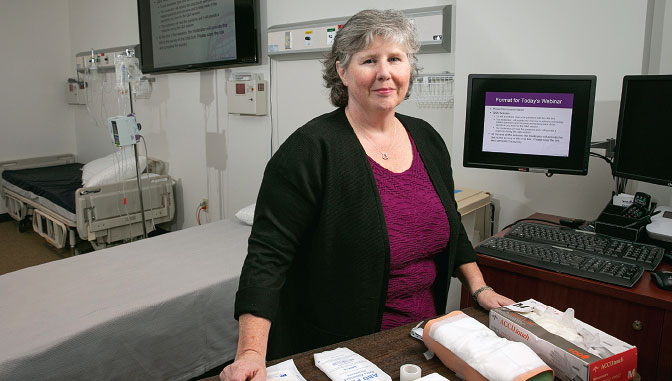CPNE Conversations

For Excelsior associate degree nursing students, the Clinical Performance in Nursing Examination (CPNE) — the capstone requirement — is the culmination of the program. Excelsior has long offered study guides, one-on-one support, and tutorials to help those preparing for this important exam, and recently, the School of Nursing began holding a series of webinars to help students. So far, they have been a valuable tool in preparing for the CPNE.
Kim Hedley, assistant dean for the associate degree in nursing program, and several other nursing faculty members began discussing webinars in November 2016. Hedley says a team member suggested the group conduct monthly webinars covering different topic areas, and provide students the opportunity to connect with the faculty in a new way.
“Our overall goal is to be accessible to the student; to allow them an opportunity to find a means to get their questions answered; that meets them where they are … to help them with their success meeting their CPNE requirements.” –Kim Hedley
The group decided to host one type of webinar with predetermined topics and other webinars as an open forum in a town hall format. The series kicked off on December 7, 2016, with the town hall-style webinar titled “Conversations with Kim” and encouraged question-and-answer interaction. During a “Conversations with Kim” webinar, a moderator monitors questions in real-time so student questions can be answered immediately. Other webinars, created and presented by the nursing faculty, address specific components of the CPNE and use presentations, demonstrate patient scenarios, and ask thought-provoking questions to help students reflect on their personal learning needs as they prepare for the exam. So far, all webinars are held on Tuesdays and Thursdays between 9:30 and 10:30 am or from 3:00 to 4:00 pm, but times are flexible based on student feedback.
“Our overall goal is to be accessible to the student; to allow them an opportunity to find a means to get their questions answered; that meets them where they are … to help them with their success meeting their CPNE requirements,” says Hedley referring to the webinars.
Surveys are sent to students after each webinar session to determine whether they have met student expectations and to gather new ideas. Student feedback directs the focus of the upcoming ones. “It’s all based on feedback from our students,” says Hedley, referring to what is covered in future webinars.
The webinars have an impact. Live webinars generally have 19–20 students attending. For those who are unable to make it, recordings are archived, and as of October 2018, the recordings had been accessed more than 1,000 times.
Student remarks have been positive. Many have commented that the webinars have been “a lifeline,” and that they enjoy being able to ask questions and get immediate feedback. Some students have said they also feel less anxious about taking the CPNE. One overwhelming sentiment culled from the survey findings reveals students mostly select the following statement: “As a result of this webinar, I will be able to apply the knowledge and skills I learned from this webinar to the CPNE” as their takeaway from the interaction.
Deciding the topic of upcoming webinars mostly depends on student feedback, says Hedley. “We’re trying to meet the different needs of the students,” she explains. Connecting with students enrolled in a distance education program requires a willingness to try new ways to do so. The success of the webinar series suggests faculty and students have embraced this new idea, and it lays the groundwork for additional novel approaches.


